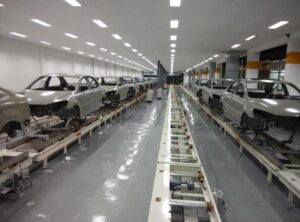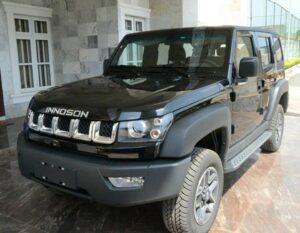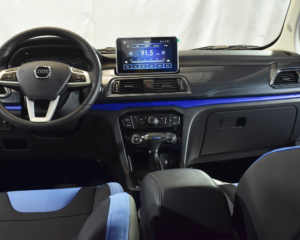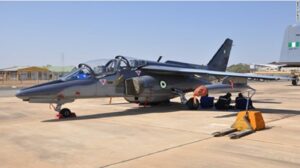The Story Behind Innoson Vehicle Manufacturing Company (IVM)

In the year was 1978; a commercial town situated in the Eastern part of Nigeria, called Nnewi was the central hub for motorcycle importation. As it is today for tokunbo (foreign used) cars, so it was then for tokunbo motorcycles, they were the status quo.
In 1978 Rojenny, Innocent’s master, was the biggest dealer on motorcycle spare-parts in the Nnewi Market. Innocent was to spend six months with his master, but at the expiry of the tenure, Rojenny came to Gabros and asked him to allow teenager to spend two years with him, offering to set him up in business with his own resources rather than the family looking for the money to do so. Gabros, who knew the value of his younger brother, turned down the offer, assuring Rojenny that the family was quite capable of funding Innocent’s start-up.
In 1979, Innocent returned to his brother, who promptly registered Gabros International to trade on motorcycle spare-parts. Innocent was given the sum of N3,000 to start, and he was allowed free hand to run it.
It was from this money that he rented a shop and bought his first merchandise. By the end of the year 1980, the company took stock and discovered that Gabros International Ltd under Innocent’s able hands was making more than ten times income than the medicine store. Gabros closed the medicine store and together with Innocent, paid full attention to the spare-parts business.
Apart from having a natural talent for trading, Innocent started early in his career to adopt the strategy of buying in bulk and selling with minimal profit. He also went along with the old saying: ‘Honesty is the Best Policy”. This enabled him to win the trust and support of his suppliers on the one hand and amass a large number of customers on the other.
Unlike other traders, especially the hungry youth in the market, Innocent refused to cut corners. Rojenny became so fascinated by Innocent’s sense of integrity that he told a gathering of young traders in Nnewi market way back in 1980: “This boy, innocent, will be richer than all of you here one day soon!”
When our team told Innoson we would like to interview Rojenny, he immediately switched on his old and inexpensive Nokia phone and Rojenny was on the line. Innoson spoke in Igbo, the phone on speaker.
“Heei!” Rojenny hailed from Nnewi, ““Okpu uzu gburuburu!” (Igbo term for technology giant). Innocent announced:
“A group of journalists are interviewing me. I am granting them a big interview that will go out to the whole world. When I told them about you they said they want to interview you”.
“Very good”, said Rojenny.
“You can now speak with them sir. The speaker is on”.
Interview was conducted in Igbo. “Chief, ndewo (greetings). We are from Vanguard Newspapers. We gave Chief Innoson an award …”
“I will tell you everything. I will tell you the secret behind his success. He is the most honest person I have ever met in my life. And he is going with my blessing o! I am the one that nominated him as Okpu uzu Ndi Igbo”
You know there is already Okpu uzu of Abiriba, Chief Onwuka Kalu.
“No, this one is Okpu Uzu Ndi Igbo N’ine. All Igbos worldwide. He has already been installed as Okpu Uzu Ndi Igbo N’ine. I first knew Innocent through his honesty and intelligence. Among the hundreds of other young boys who were into trading, I was like their godfather.
I was the one that copied Japanese technology through Taiwan manufacturers and brought it into the country. And I was the highest importer. When he comes to me he will tell me the honest prices of the spare-parts.
When I ask other people the prices they were selling to retailers they will undercut the price and tell me lies to maximise profit while I will sell at a loss. But innocent will tell me the true price. I used to be shocked at his honesty. He was the only one telling me the truth, and the truth was shocking me to my marrow. And even at that he will buy about 25 to 30 per cent of my entire stock.
And he will be selling almost at the price of an importer. The other people will undercut the price, buy low and sell at cutthroat prices to the final consumers. And I told not only him but the others also that this boy will be the richest among them. I am happy that my prediction has come true in my lifetime.
And even today, the wealth has only started, yet he is still very humble, very honest. The volume of money he has made has not entered his head like other Igbo men. He is humble like me, his Master, the Ogilisi Igbo. Ogilisi is a tree that is respected and valued in Igboland. The boy is too much. He is too much.”
That was in 1981. When his brother, Gabriel, decided to get married a decision was made that Innocent should start his own business and become independent. Gabros gave him N20,000 to start. Being the mainstay of Gabros International, was this amount okay with him?
“I was quite okay with money”, Innocent said. “Even if he gave me less than that. I had made my own money and I knew the business very well.
I could have coped very well with anything. I then registered Innoson Nigeria Ltd. I believe even now, in putting a small profit margin and selling in large quantities. That is why I always have many customers. People know me as someone who uses little profit to sell; so many customers want to buy from me”.
At every juncture that Innoson broke new grounds, he was always led to it by necessity. The old sayings that necessity is the mother of invention, and that in every crisis there is opportunity fit his circumstances like a glove.
For instance, in 1984 when the military intervened and introduced an economic regime that led to scarcity of all categories of goods, many companies closed down. Leventis and other companies were no longer able to supply goods and Innocent had to look for greener pasture in Asia.
He went to Taiwan and applied the same business principles he had used to win over Rojenny in Nigeria: honesty as the best policy. His Taiwan partners started giving him credit sales. The banks in Nigeria started scrambling to loan him money because he never defaulted and his business was booming.
But the prices of motorcycles, just like cars, kept climbing as a result of the deteriorating value of the Naira and other unfavourable economic policies of successive military governments. Businesses were suffering. Innocent started looking for ways of bringing down the cost of motorcycles to increase sales.
The next decision he took ultimately led to the establishment of two mega-companies that shot him to limelight: the Innoson Vehicle Manufacturing (IVM) Nnewi and Innoson Tech and Industries, Enugu, the largest plastic manufacturing plant in Africa. He tells the story himself:
“As time went on, most machines that were brought in from Japan became very expensive. I was looking for ways of bringing down the prices of motorcycles and their spare parts. So I went to China and found out that it was cheaper for me.
I found out that the motorcycles from Leventis were expensive because they were only able to pack forty units into a 40-foot container. Because of the experience I had in motorcycle spare parts, I went there and asked them to strip it down to pieces.
That way I was able to pack over 200 units of motorcycles into the same 40-foot container, while others were packing 30, forty pieces. I will bring the spare parts down here and couple them manually. Because of my experience in motorcycles I found it very easy.
All I had to do was hire some boys and mechanics and I taught them how to couple them back. That time (around 1987) they were selling a single unit of motorcycles for N150,000. I was the first person that brought Jingcheng in Nigeria. Jingcheng is Suzuki equivalent from China Jiachi is Yamaha equivalent, nothing different.
“Later I decided to brand my motorcycles Innoson. I coupled them manually and sold them for N70,000 to N80,000. THE FIRST ONE I BROUGHT TOOK ME ABOUT THREE MONTHS TO SELL BECAUSE PEOPLE WERE NOT SURE OF THE QUALITY OF MY BRANDS.
When I brought my second order from China I sold the five containers consisting of over a thousand units of motorcycles within one month. I went back, bought ten containers. Before they arrived people had paid in advance and everything was sold even before the containers arrived. People waited for their machines to be coupled to take them away.
There was a time I sold 200 containers of motorcycles in one month that is over 40,000 units. Before people discovered what I was doing and started doing the same thing, I had enjoyed the business for three years. At that time, old tokunbo was about N90,000. I brought brand new and sold for N70,000. And the ones they were selling at Boulos was well over N100,000.
Forcing tokunbo motorcycles out of Nigeria
To make my own cost to come down more, I moved. I looked at a motorcycle and realised that there is a lot of plastic on the body of a motorcycle. I set up a plastic factory. I decided to produce all the plastic components in my factories so that more units of the spare parts can go into a container. With the plastic components, we were packing about 210 units of motorcycles into a container.
But when the plastics were removed they were packing about 240, 250 units. It made the prices of my brand to come down more, so I was still in control of the market. The unit price of motorcycles came down to N60,000. Once we brought the price of a brand new motorcycle to N60,000, tokunbo motorcycle goes from Nigeria”. That was in 2002.
At this point, adversity started setting in. Everybody, including the Indians in Nigeria, seemed to be involved in the motorcycle business. Worst of all, state governments started banning commercial motorcycles as a means of urban transit due to the involvement of okada riders in heinous crimes and high fatalities. The future of the business became bleak.
“That was when I decided to go into motor manufacturing”, said Innoson. “I did not go into motors overnight. It took me at least seven years before I moved into it. I looked at motor and I decided that they can ban motorcycles but no one will ban motor. I travelled overseas more than six times to study and come up about how to produce motor here in Nigeria. I visited motor factories in America, Japan, Taiwan and China. I am a very amiable customer, and so, I was allowed to visit these factories and I was asking questions though they did not know what I had in my mind.
They showed me what they wanted to show me and that was enough for me to know how to start. I decided we can do it in Nigeria, unlike before when I thought it cannot be done here. I found that that most of the things they do there which makes the whole thing look difficult or impossible can be done here if you adopt a different strategy.
For example, in America after finishing the production of the body you put it on a trolley and push it to another section for another stage of work. But in America and Japan they will just press a button and it will go on its own to the next section. That is the difference between my factories and anywhere in the world”.
While we toured the IVM plant in Nnewi, we were a little dismayed by the fact that many of the vehicle manufacturing processes were still rather manual. The impression created of vehicle manufacturing is that of a highly automated and mechanised process. Asked if he is hoping to get to that level of automation one day, Innoson waxed philosophical and socialist.
“I don’t think we need to do automatic (automation) here because people need to work. Any work that a person can do well should be given to a human being, not a machine. A human being has family to feed and clothe but a machine has no family, no problem to solve except to do its work. All we will do as we go on is to employ more people when we get bigger.
That does not mean that we will sacrifice efficiency in any way. We will give work to the people wherever we can. I am advising people in Nigeria not to do too much automatic. If they do too much automatic they will not employ people.
The major need of this country is to give people something doing. It gives me joy when I see some people that don’t have job and I give them the opportunity to have work. I know that a businessman always wants to reduce cost. Reducing cost is good. But there are some costs I don’t want to reduce. There are certain things we must give a human being to do. People are looking for work. They are begging you for work.
“You have work but you decide to give to a machine. I don’t want to do that. The land where I built the motor factory in Nnewi was given to me free by the community just to make sure that I employ people.
Now if I decide to use automatic where will the people work? In fact, some of our employees when they come here they learn from working in our factory and go out to start doing something of their own. Somebody who was working in my factory before is now supplying me with certain items. He is supplying me boot for bigger buses. Instead of me to be doing it in this factory he produces and supplies based on our specification.
It gives me joy to see such a thing. He learned it from me and went out to fabricate it and supply me. So you have to consider the bottom-line and the people. You cannot sacrifice the people on the altar of bottom-line, but you must also operate efficiently and profitably, giving the society value. My manager in Nnewi, Nnamdi Onusogu, has worked with me for 24 years…”

But we saw that he was using a Peugeot car rather than Innoson product?
“He has been using it and the car is still good. When it becomes old he will pick up an Innoson car. He doesn’t have to throw away the car now.
The car is older than the factory. When the car is old enough we will give him Innoson. Some of our workers are using Innoson. My managers in Abuja and Lagos and here are using Innoson. I am using two Innoson; a pick-up and one SUV”.
But you shouldn’t be riding any other car?
“Why? Am I in a prison? I use any car I like because I have the money. I can afford to buy any car. But I have an Innoson SUV to prove that it is one of the best in the world. I know what people want in SUV and I added a few extras to give Innoson SUV an advantage. I commissioned a German engineer to design it. It is powered by Mitsubishi engine”.
At the Nnewi plant we saw all types of automobiles but no sedans or cars. When we pointed this out, he said cars would start rolling out of the plant from next month (April 2014).
“I am working to have a brand new car sold in Nigeria for about one million or a bit more. It will be a little more than one million when we start but as time goes on it will come down. A car of about the calibre of Toyota Corolla should be less than two million when we start, and the quality will not be anything less”.

His dream is that as soon as the cars start tumbling out of the factory, he will push towards making second hand vehicles (popularly called tokunbo cars) nonviable in Nigeria. “You see how tokunbo motorcycle go? Is anybody talking about it anymore?
The only thing it will take for tokunbo car to go from Nigeria is price. Make it cheap and affordable; make the spare-parts available, and tokunbo WILL GO. Who will like to buy an old car when he or she can spend less and by brand new? I must make new one to be cheap so that tokunbo will go in the nearest future. As from April I will flood the market with Innoson cars at cheaper price”.
Luck is on his side because the Federal Government has become very interested in getting vehicles made locally in Nigeria. In fact, President Goodluck Jonathan commissioned the Nnewi motor plant and proceeded to roll out a new national Automotive Policy.
Governments at the federal and state levels are the greatest customers of Innoson Motors, and Chief Innocent is delighted. He would never forget former Governor Peter Obi’s support, which has also drawn patronage from other states such as Delta, Ekiti, Imo and Enugu.
Innocent Chukwuma cannot understand why any young person should sit at home and complain about unemployment.
“Young people should never waste their youth. I never wasted my own. There is work everywhere in Nigeria. The only problem is that most young people don’t like to do “dirty work” yet it is dirty work that gives money. Most of the graduates are not employable. Majority of them have the wrong mentality.
They want to work in banks, oil companies or to become politicians and get rich overnight. There is a lot of job opportunities in farming, but how many young people want to become farmers? The best way to become rich is to go and become a farmer.
“All quick money politicians are making will not last. Young people must use their time as youth to work and build their future”.
By 1987, a brand new motorcycle sold for N150,000 and a tokunbo one sold for N100,000 – N90,000. Things would have continued this way to this day, but for the intervention of a 25 years old Nigerian, named Innocent Chukwuma, the founder of Innoson Motors (IVM).
Driven by his passion for people and his core business philosophy of bringing down costs and passing the gain to customers, he pioneered the first Made-in-Nigeria Motorcycle brand that sold for as low as N60,000. By year 2002, he had successfully driven out tokunbo (foreign used) motorcycles out of Nigeria forever!
Presently, They are manufacturing durable and affordable brand new automobiles for Africans. Their brand new automobiles are selling for almost the cost of their tokunbo equivalents. And they are as good as any foreign automobile brand you know.
The statistics are alarming, according to a recent research by PricewatershouseCoopers (PwC), the ratio of brand new automobiles to foreign used ones on Nigerian road is 1 : 131. Meaning that for every brand new car bought, there are 131 tokunbo ones!

Sources: Vanguardngr.com/Innosongroup.com/CNN.com
